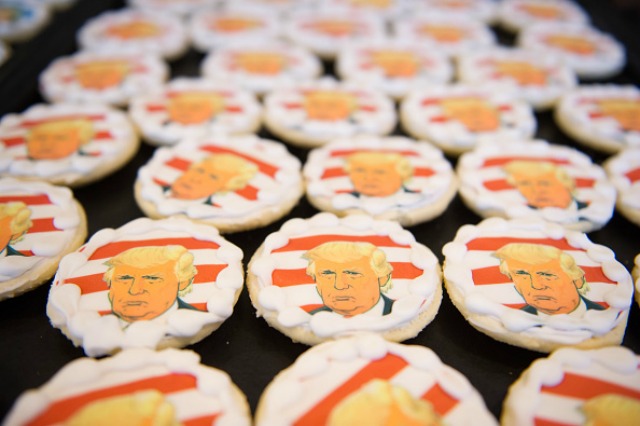Holiday Politics: Thanksgiving, Trump & 'The Talk'
By Stephen Gossett in News on Nov 23, 2016 5:35PM

Getty Images / Photo: Jeff Swensen
I’m lucky. While hardly hard left, my immediate family is progressive-minded enough that, were I going home for Thanksgiving this year, I would be spared the year’s most nagging ethical/political dilemma: to engage or not engage the pro-Trump voter(s) in your bloodline. And the tougher follow up, of course: how the hell do you do so in a way that’s actually constructive?
While I skirted free on a technicality, I thought of my friend M. (who requested anonymity), whom I suspected wouldn’t be so lucky. Like me, M. is white and hails from the rural/sub-rural exurbs of St. Louis, MO, where the deep blue oasis of the city—the land that Sarah Kendzior calls home—gives way to the deep red that is the rest of the state, save a college town in the middle and Kansas City on the west. Like me, he moved to Chicago because St. Louis offers little launch in terms of his chosen, creative industry. (For him, it’s acting; if you’re a local theatre hound—or if you caught ads during some major sporting events over the last year or so—you’ve seen some of his work). Unlike me, however, his Facebook timeline is a tortured, passionate mix of cri de coeur and semi-resigned hope, with the unstated audience oftentimes clearly his own family.
As it turns out, M. has decided to skip a return visit for Thanksgiving. Politics were hardly the motivating factor, he said. Continuing to cement new holiday traditions with the family of his own here in Chicago was the main impetus; but he acknowledged the election was “definitely the sealant” on the decision.
“This is the best year ever to not go down there,” he said. “Our minds were fairly made up, but any twinge of making the trip was gone” after the results. When asked whether or not he felt any ethical impulse to interrogate, for lack of a better word, family members who voted for Trump, he said, “absolutely.” Then a long pause “But it’s tough.”
“It’s raw this year," he said, audibly pained. "My dad, whom I’ve always respected and though of as an intelligent person, but in regards to politics, he doesn’t see things from both sides. I think he only gets his information from memes and Fox News. When I try to sway him, he can get nasty.” He also recalled engaging a cousin who voted for Bernie Sanders in the primary but then cast his ballot in the general for Trump. The conversation didn’t go well; but he tried.
Chicago is of course chockablock with people like M. and me—transplants from Trump-favoring Midwest and Great Lakes states like Missouri, Wisconsin, Indiana and Michigan. We relocated not only for careers but (if you’re feeling generous) for more diverse, liberal, cosmopolitan experiences and ideas or (if you’re not feeling generous) to play our prescribed role in the self-segmenting Pageant of Sort. I asked a colleague who also fits into this pattern—he hails from a collar town near one of Wisconsin’s more populous metros—about his Thanksgiving plans and what obligations he felt.
My colleague, who asked to not be identified, doesn’t have Thanksgiving plans with family. That’s because he was disinvited. Certain family members—who go beyond conservative into the realm of “white supremacist,” he said—thought his work skewed too blue, and that was that.
“It kinda sucks. I haven’t seen my sister in three or four years. It’s shitty that something like this can fracture things,” he said.
Showing Up For Racial Justice (SURJ) put out some discussion guidelines that I found instructive—an approach that recognizes the futility of escalation and urges listeners to “drop shaming, blaming and stereotypes.” (SURJ is coalition of groups that organizes white people for racial justice. To that end, I agree with people like transgender activist Tiq Milan, who said after the election, "This is the time for our white allies to collect their folks, do the bulk of this work and make this right.")
For example, they put forth this hypothetical dinner-table declaration from a Trump supporter, plus a thoughtful potential response:
"- I'm not a racist for supporting Trump.
- I'm really happy to hear you say that you are against racism. I'm worried because I've heard Trump say things about Muslims, immigrants, and people of color. I understand that you don't agree. Have you thought about ways to show people of color that you're with them?"
“If I asked that last question, I’d have more success with a brick wall,” my colleague said. If one thing’s clear right now, it’s that this isn’t going to be easy.
I’ve seen other approaches, too. They range from outright disengagement to something more technocratic. (FIveThirtyEight suggested posing your Trump uncle a question along the lines of, What do you think should be done about the electoral college?) Given the acute nature of the crisis—and I think it’s fair to characterize it as such—the SURJ model still seems best to me, even if some causes seem beyond repair.
That’s easy for me to say. Like I mentioned, I’m one of the lucky ones. But of course, it’s never been clearer that the ethical obligation is most incumbent on the lucky. My family voted “the right way” but they’re hardly activists—the kind of folks who wouldn’t know William Kunstler from Ian Kinsler. Again, that isn’t to shame them—every day I’m realizing how much further I have to go myself—but to point out that none of us are exempt from the critical lens the day demands.